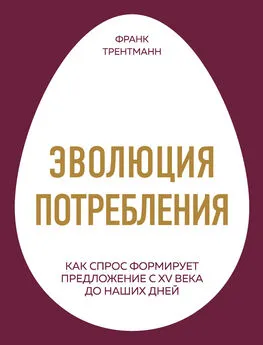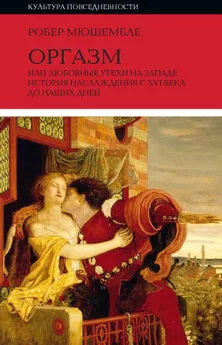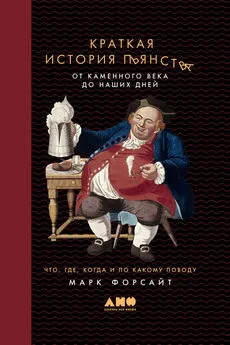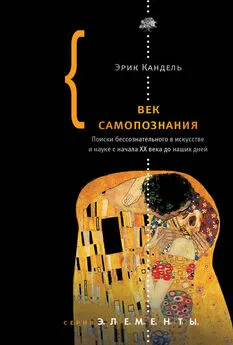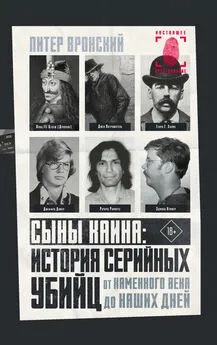Франк Трентманн - Эволюция потребления. Как спрос формирует предложение с XV века до наших дней
- Название:Эволюция потребления. Как спрос формирует предложение с XV века до наших дней
- Автор:
- Жанр:
- Издательство:Литагент 5 редакция «БОМБОРА»
- Год:2019
- Город:Москва
- ISBN:978-5-04-088674-6
- Рейтинг:
- Избранное:Добавить в избранное
-
Отзывы:
-
Ваша оценка:
Франк Трентманн - Эволюция потребления. Как спрос формирует предложение с XV века до наших дней краткое содержание
Эволюция потребления. Как спрос формирует предложение с XV века до наших дней - читать онлайн бесплатно ознакомительный отрывок
Интервал:
Закладка:
190
James Howell, 1650s, цитируется в: The Vertues of Coffee .
191
Habermas, Transformation ; Brian Cowan, The Social Life of Coffee: The Emergence of the British Coffeehouse (New Haven, 2005); Hochmuth, Globale Güter ; James Livesey, Civil Society and Empire (New Haven, CT, 2009); Jean-Claude Bologne, Histoire des cafés et des cafetiers (Paris, 1993).
192
P. «Considerazioni sul Lusso», из: Il Caffè (Milan, 1764), 110, мой перевод.
193
Amanda Vickery, The Gentleman’s Daughter: Women’s Lives in Georgian England (New Haven, CT, 1998), 206—8.
194
Michael North, Genuß und Glück des Lebens: Kulturkonsum im Zeitalter der Aufklärung (Cologne, 2003), 209.
195
Jean de La Roque, An Historical Treatise Concerning the Original [ sic ] and Progress of Coffee, as well as in Asia as Europe (1715; London edition, 1732), repr. из: Ellis, ed., Eighteenth-century Coffee-house Culture, Vol. IV, 277–312. О Де Ла Роке см.: Ina Baghdiantz McCabe, Orientalism in Early Modern France: Eurasian Trade, Exoticism and the Ancien Regime (Oxford, 2008), 172f.
196
Anne McCants, «Poor Consumers as Global Consumers: The Diffusion of Tea and Coffee Drinking in the Eighteenth Century», Economic History Review 61, 2008: 172–200; Wouter Ryckbosch, «A Consumer Revolution under Strain: Consumption, Wealth and Status in Eighteenth-century Aalst», PhD thesis, Antwerp (2012); John Styles, «Lodging at the Old Bailey: Lodgings and Their Furnishing in Eighteenthcentury London», из: Gender, Taste and Material Culture in Britain and North America, 1700–1830 , eds. John Styles & Amanda Vickery (New Haven, CT, 2006); а также Lorna Weatherill, Consumer Behaviour and Material Culture in Britain, 1660–1760 (London, 1996, 2nd edn).
197
Edward Eagleton, 1785, цитата из: Hohcheung Mui & Lorni Mui, Shops and Shopkeeping in Eighteenth-сentury England (London, 1987), 257. Для разнообразия см.: Jon Stobart, Sugar and Spice: Grocers and Groceries in Provincial England, 1650–1830 (Oxford, 2013), 50—6.
198
Hochmuth, Globale Güter , 134, 142.
199
Robert Batchelor, «On the Movement of Porcelains: Rethinking the Birth of the Consumer Society as Interactions of Exchange Networks, China and Britain, 1600–1750», из: Consuming Cultures, Global Perspectives , 95—122.
200
Вывод сделан на основе: Maxine Berg, Luxury and Pleasure in Eighteenth-сentury Britain (Oxford, 2005), 52–75, 128—49; Chaudhuri, Trading World of Asia; Chuimei Ho, «The Ceramics Trade in Asia, 1602—82», из: Japanese Industrialization and the Asian Economy , ed. A. J. H. Latham & Heita Kawakatsu (London, 1994), 35–70; Fang Lili, Chinese Ceramics (Beijing, 2005).
201
Jonas Hanway, Letters on the Importance of the Rising Generation of the Labouring Part of Our Fellow-subjects (London, 1757), II, letter XXX, 174—85.
202
Legrand d’Aussy, Histoire de la vie privée des François (Paris, 1815; 1st edn 1783), 145, перевод мой.
203
La Roque, Progress of Coffee , 366.
204
Dr Fothergill в обращении к J. Ellis, 2 September 1773, из: John Ellis, An Historical Account of Coffee (London, 1774), 38, repr. in Ellis, ed., Eighteenth-century Coffee-house Culture, Vol. IV .
205
Postleth-wayt, The African Trade (1745), цитата из: Eric Williams, Capitalism and Slavery (Chapel Hill, NC, 1944/1994), 52.
206
Joseph E. Inikori, Africans and the Industrial Revolution in England (Cambridge, 2002); «Roundtable, Reviews of Joseph Inikori, Africans and the Industrial Revolution in England», International Journal of Maritime History XV, no. 2, Dec. 2003: 279–361. Patrick O’Brien, «Fiscal and Financial Preconditions for the Rise of British Naval Hegemony 1485–1815», working paper 91 (2005), http://www.lse.ac.uk/collec-tions/economicHistory/pdf/WP9105.pdf.
207
S. D. Smith, «Accounting for Taste: British Coffee Consumption in Historical Perspective», Journal of Interdisciplinary History 27, 1996: 183–214.
208
La Roque, Progress of Coffee ; Zedler’s Universal-lexikon , цитата из: Annerose Menninger, Genuß im kulturellen Wandel: Tabak, Kaffee, Tee und Schokolade in Europa (16. —19. Jahrhundert) (Stuttgart, 2004), 317.
209
Fothergill to Ellis, 2 September 1773, in Ellis, An Historical Account of Coffee (London, 1774), 30.
210
Edward Gibbon Wakefield, England and America (New York, 1834), 84.
211
Как и в случае с производством шерсти в Йоркшире.
212
Berg, «Pursuit of Luxury». Я написал «способствовало», так как потребительский спрос сам по себе не мог быть причиной для Промышленной революции. В то же время многочисленные связи между зарубежными и отечественными явлениями не дают провести четкое разграничение между внешними и внутренними факторами. О европейском прогрессе в науке и технологиях см. Joel Mokyr, The Gifts of Athena: Historical Origins of the Knowledge Economy (Princeton, NJ, 2002).
213
Jan De Vries, European Urbanization, 1500–1800 (Cambridge, MA, 1984); Paul Bairoch, De Jéricho à Mexico: Villes et économie dans l’histoire (Paris, 1985); Peter Clark, ed., The Oxford Handbook of Cities in World History (Oxford, 2013). Ли Бочжун в своем недавнем исследовании приходит к выводу, что не менее 20 % населения в регионе Цзяннань жили в городах в эпоху Цин. Меня в данной ситуации больше волнуют степени, а не абсолютные величины. Не стоит говорить, что в Китае не было городов; они были, просто в меньшем количестве.
214
Weatherill, Consumer Behaviour and Material Culture in Britain, 1660–1760 , таблица 4.2. Как она отмечает, исключения составляли менее бросающиеся в глаза предметы, такие как книги.
215
Andrew Hann & Jon Stobart, «Sites of Consumption: The Display of Goods in Provincial Shops in Eighteenth-entury England», Cultural and Social History 2, 2005: 165—87, особенно 177.
216
Bernard Mandeville, The Fable of the Bees (1714; London, 1989), Remark (M), 152. Это распространенное наблюдение, например, у Джона Рэя: «В городе Молли Сигрим восхищались бы как самой утонченной леди, но в деревне ей доставались только насмешки»: Statement of Some New Principles on the Subject of Political Economy (Boston, 1834), 280.
217
Stephen D. Greenblatt, Renaissance Self-fashioning (Chicago, IL, 1960); см. также P. D. Glennie & N. J. Thrift, «Modernity, Urbanism and Modern Consumption», Environment and Planning D: Society and Space 10, 1992: 423—43.
218
По мнению Wim van Binsbergen, из: Wim M. J. van Binsbergen & Peter L. Geschiere, eds., Commodification: Things, Agency and Identities (The Social Life of Things Revisited) (Münster, 2005) цитата со с. 33. См. также: Igor Kopytoff, «The Cultural Biography of Things», in Appadurai, ed., Social Life of Things , особенно 84. Является ли такая трактовка Декарта или Канта убедительной, это уже другой вопрос. То, что картезианское эго было больше, чем просто разум, доказывается в работе: Karen Detlefsen, ed., Descartes’ Meditations: A Critical Guide (Cambridge, 2013).
219
Bruno Latour, «From Realpolitik to Dingpolitik», из: Making Things Public: Atmospheres of Democracy , ed. Bruno Latour & Peter Weibel (Cambridge, MA, 2005); Bruno Latour, We Have Never Been Modern (Cambridge, MA, 1993); см. далее: Frank Trentmann, «Materiality in the Future of History: Things, Practices and Politics», Journal of British Studies 48, no. 2, 2009: 283–307.
220
Harold J. Cook, Matters of Exchange: Commerce, Medicine and Science in the Dutch Golden Age (New Haven, CT, 2007).
221
Brook, Vermeer’s Hat, цитата на с. 82. См. также: Schama, The Embarrassment of Riches .
222
Thomas Mun, England’s Treasure by Forraign Trade (London, 1664), 108.
223
Some Considerations Touching the Usefulness of Experimental Natural Philosophy (Oxford, 1663) из: Works of the Honorable Robert Boyle (1744), 56.
224
Bishop of Rochester, Thomas Sprat, The History of the Royal Society of London (London, 1667), 381, 384.
225
Nicholas Barbon, A Discourse of Trade (London, 1690), 14–15.
226
Bernard Mandeville, The Fable of the Bees (1714; London, 1989), 68, 69. 58. As does Clunas, Superfluous Things , 146.
227
Daniel Defoe, A Plan of the English Commerce (Oxford, 1728/1927), 77, 144—6. John Cary, An Essay on the State of England (Bristol, 1695), в особенности 147. См. также: Richard C. Wiles, «The Theory of Wages in Later English Mercantilism», Economic History Review , new series, XXI/1 (April 1968), 113—26; Paul Slack, «The Politics of Consumption and England’s Happiness in the Later Seventeenth Century», English Historical Review CXXII, 2007: 609—31; Cosimo Perrotta, Consumption as an Investment I: The Fear of Goods from Hesiod to Adam Smith (London and New York, 2004).
228
Berry, The Idea of Luxury; Perrotta, Consumption as Investment; Maxine Berg and Elizabeth Eger, eds., Luxury in the Eighteenth Century: Debates, Desires and Delectable Goods (Basingstoke, 2003).
Читать дальшеИнтервал:
Закладка:
